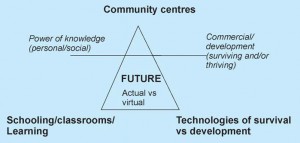 Singapore schools promote e-Learning in case of emergency closur
Singapore schools promote e-Learning in case of emergency closur
Some schools in Singapore have adopted an e-Learning system to keep up with lessons for their students in the event of a flu pandemic. In case of an mergency closure, teachers in these schools may upload lesson slides, set omework for their students, track whether the homework is done, and even conduct tests online. Students can discuss study topics with each other and post questions to their teachers all day long by way of online forums. However, the e-Learning system is inapplicable to some neighborhood schools as its operation costs at least 20,000 Singapore dollars (about USD 12,000) a year and some of their students do not have broadband access at home. The Education Ministry is saying that it will facilitate free-to-air television roadcast
services to ensure that all students can continue with their lessons once the schools are shut.
Taipei tsunami aid pays for e- Learning centre in Indonesia
The post-tsunami relief effort of Taipei residents and the city government has facilitated the launchof an e-Learning centre in Aceh, Indonesia after the re gion was devastated by the Dec. 26, 2004 tsunami disaster. The centre was built with USD 1.14 million donated by civil groups, individuals and Taipei City
Government staff. It will offer free Internet and Chinese language courses to about 2,000 high school students each year.
Filipino schools seeing the benefits of e-Learning
The Department of Education (DepEd), Philippines has stressed the need to make the school curriculum relevant. Through the “School-based ICT in Education Program”, teachers have to take on technology as their ally in catching the attention of new learners who are said to be multitaskers and have a penchant for things that are visual and auditory. With these in mind, Genyo, an integrated e-Learning program was developed by Diwa Learning Systems,
one of the main sources of books and educational materials for Filipino students for the past 25 years. Diwa Learning Systems believes that “the perfect e-Learning environment is where superior learning happens.” Studies have shown that students only retain: 20% of what they see; 30% of what they hear; 50% of what they see and hear. But of what they see, hear and do imultaneously, 80% is retained. With the superior education environment that
e-learning provides, effective teaching and faster learning take place.
Radiant launches Community PC
Radiant Infosystems, has launched Community PC, a rural Internet kiosk in the Indian state Andhra Pradesh as a part of its project Rajiv Internet Village, an e-initiative by the government of Andhra Pradesh to enrich the interaction between rural residents and service providers(government/business), by
harnessing information ad communication technology capabilities. Designed as a result of defining locally relevant computing solutions based on Intel echnology, the Intelpowered Community PC platform is equipped to operate in a community setting while accommodating the varying environmental onditions prevalent in the country. The Rajiv Internet Village has been taken up as a pilot project in Chittoor and Kadappa districts with 10 PCs. On seeing
success in the sphere of online activities by villagers, it will be replicated with 1500 PCs in 14 districts in the state.
Microsoft in making of selfsustaining rural India
Microsoft Corporation (India) Pvt. Ltd is going to launch a rural portal shortly within next three to six months. The company is looking at partnerships to develop the portal with relevant information. The company has unveiled a elfsustaining kiosk model initiative aimed at taking IT benefits to rural India. It is a public-private partnership, called as Saksham (meaning self-sustaining in Sanskrit), on which the portal is being developed. Market linkages will be strengthened in association with ICRISAT and other institutes.
An online course for CET 2006
To help the aspirants of Common Entrance Test 2006 (CET 2006) in India, e-Learning company Radius Consultancy which is involved in the promotion of open source software has designed a novel online course. CET Online is available as an anywhere, anytime learning course, which will prepare the aspirants to perform better in the ensuing CET 2006 examinations. The web-enabled courses are accessible through the Internet enabled PCs, school
computers, service providers network and Internet browsing centres. The first level is an introductory course covering soft skills, previous year question papers, mock tests and internet resources. The URL is www.virtualteacher.org/cetonline. The second level course is designed to enable aspirants from rural areas with low bandwidth connection, while the third level course is meant for urban centres with high bandwidth, a web cam and a headset. Those desirous of having one to one tutoring through video conferencing may avail the opportunity through the use of their own computer
systems or through the facilities available at Reliance Web World established in Chennai, Vellore, Pondy, Salem, Erode, Tirupur, Coimbatore, Madurai, Triuchi, Tanjore and other towns.
Website for Vedic literature launched in Chennai, India
A website on Vedic literature, history and music, www.vedicsangeet.in, was launched at a seminar on the importance of Vedas in modern times in Chennai, India. The seminar was organised jointly by Bharatiya Vidya Bhavan, Chennai
Kendra and Vedic Sangeeta Foundation. The site introduces the four Vedas and details events and programmes of the Foundation.
A separate classroom for Haryana teachers
The government of Haryana in India and Intel India join their hands together to equip teachers of Haryana to become professionally well in the computerised environment in schools. The state government has accepted the proposal from Intel to train the teachers. Intel’s training programme for teachers would include their sustained professional development for the integration of ICT in
government schools in the state. The programme also includes a posttraining implementation factor. Intel would collaborate with the commissioner and director general, school education, Haryana, to develop independent subject-wise education modules.
Educomp to add 250 more people
e-Learning solutions provider in India Educomp Solutions Limited plans to scale up headcount at its Bangalore facility by adding 250 people. The company plans to invest close to INR 40 million in a new 30,000 sqft facility, that would house its global development centre here. Educomp is in the business of developing digital content meant for K12 students (kindergarten to class 12), and has installed its ‘Smart Class TM’ — an end-to-end multimedia
learning solution which comprises of nearly 8000 digital modules on a host of subjects — in over 900 schools in the country. Educomp proposes to reach out to 10 million e-Learners by 2008. It has trained close to three lakh teachers in 20 metros and 40 peripheral towns across India, having worked with 5000
schools so far.
India ranked 40th in Global ICT index
Despite all the hullabaloo about India’s prowess in IT and skyrocketing telecom subscriptions, the country still figured at the bottom rung (rank 40) in the World Economic Forum’s Global Information Technology Report 2005-2006. US topped the list, followed by Singapore, Denmark and Iceland at second third and fourth positio ns, respectively. India’s ranking at 40th position amongst 115 economies remained largely unchanged. In fact, India slid one rank from last year’s 39th position. China’s rank dropped 9 positions from 41st last year to 50th position this year.



















